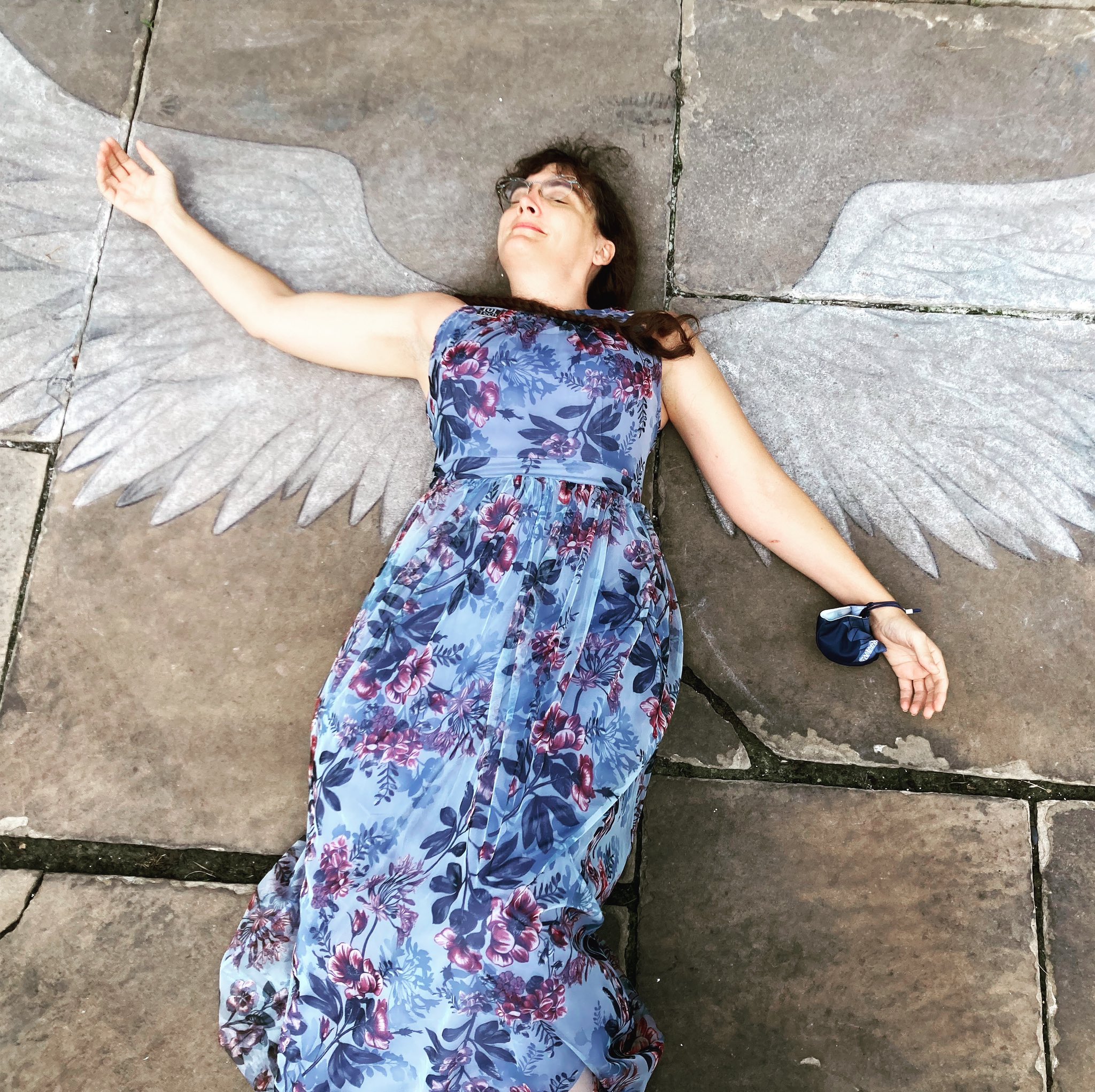That endings should be “surprising yet inevitable” has been often quoted writing advice (some attribute it to Flannery O’Connor, but I cannot verify that.) My friend and fellow science fiction writer Charles Oberndorf – a more accessible source – said to me in workshop once, “the ending of a literary story should feel like the snap of a purse. It’s not necessary that everything is resolved, but that last thought, that last line, should create a sense of finality.”
When I read A Manual for Cleaning Women, Lucia Berlin’s short story collection, her endings resounded with that firm clasp, that sense that you didn’t see them coming, but that the story could not end any other way. Could I learn from her how to do that?
Endings are, for me, one of the most challenging aspects of fiction writing. The edict, “surprising yet inevitable” is itself contradictory. The phrase frizzles with tension from that contradiction, and that might be why it is so often repeated.
Nor is it the only contradictory advice out there. An article in writer’s digest[1] recommends, “by the end of the story your primary and secondary plotlines have to reach their proper conclusions – with no loose ends dangling. All character and thematic questions must be addressed, all conflicts resolved, and any moral quandaries settled.” That’s a tall order! And yet another article praises the open ending –that is, an ending that doesn’t resolve all plot and thematic material— for “…its ability to provoke the reader’s imagination and speculation about the characters and overall message of the narrative.”[2] In workshop, I have had readers demand that all “loose ends” be tied up in a manuscript, and then report on the next draft that the story had become lifeless because of the careful tidiness of the ending. Advice and guidance on endings can feel dizzying to the point of gaslighting. And on top of everything else, we are asked to do it quickly. One sentence, half a sentence: reveal all, answer all, denouement in a semicolon, the bombs are dropped, and the explosion goes off in the reader’s mind.[3]
So, what makes Lucia Berlin so good at the short story ending, and more importantly, can studying her endings reveal the secret to crafting good, inevitable, explosive endings ourselves?
Let’s look at one. I’m charmed by the end of the story “Melina,” which comes in a single sentence. The story opens in a calm, suburban life, a woman walking her child in a stroller while her husband is busy, a chance encounter with a beatnik, who tells the story of falling in love with a woman named Melina, whom he describes as otherworldly, “like milk glass.” The narrator compares this story of being blown away by a mysterious woman with her husband having never gotten over “the woman in the grass,” an almost mythical former love.
The theme of the story at first seems to be patriarchy. In that first scene, a random man accuses the narrator of not knowing something is wrong with her child, and this stranger, Bo, with no qualifications, says, “Nothing wrong with this child’s feet,” and the old man believes him because he’s a man. Then we get the story of Bo’s love for Melina, and the related story of the husband’s past love. Both loves are told from the male perspective, as though the men’s own desire was something the woman did, a power she had– a common patriarchal trope of putting responsibility for men’s emotions on women.
Then an actual woman named Melina enters the story, fully realized and just as fascinating to our female narrator. They become close. My favorite description of this is, “We talked about all the important shoes in our lives.” The narrator believes this is the same Melina who so captivated her friend. “I held her hand and remembered what Bo had said about her skin. It was like holding cool glass, silver.”
She is jealous of Melina, and tricks her, giving her a palm reading that is a re-telling of all she already knows about her. “You are a witch,” Melina exclaims, and the narrator is triumphant.
Then… the ending… in one fell swoop, all three lives are tied together. How? The husband character confesses, “That was her… Melina. She was the woman in the grass.”
The story feels plain and simply told, one subject casually leading to the next, a meandering feeling, like these are just unconnected events. I met a beatnik. We talked about love. I met a woman. Through it all there is a thread of unspoken jealousy, the narrator’s jealousy over her husband, jealousy toward these myth-women, and toward the real Melina. It is having that which permeates so quietly brought into sharp focus that adds inevitability to the surprise ending. And the surprise itself – that our narrator has been jealous of the wrong man – or the wrong Melina – brings us back to the patriarchy section at the start. Her crime is in not believing a woman until a man spoke.
The surprise helps, but do we need it? “Carpe Diem” is a story that ends like a parable, with a quiet moral to the story: a promise to seize the day. The narrator, who begins the story, “Most of the time I feel all right about getting old…. Other things throw me into a panic, like BART doors,” ends it, “Next time I’m on BART, I won’t even think about getting off until the train stops. When it docs, I’ll hop up and rush down the aisle, will get out just in time.”
Set next to each other, it’s easy to see the ending and beginning bookend each other. Here’s some more oft-quoted writing advice: the good ending is contained in the good beginning. Between them we get a trip to the laundromat, minor inconveniences, and tension with a stranger, which leads the narrator to relinquish some of her own tension. She never says, “I saw how upset this man with youth and vigor got over something so minor that I realized I didn’t want to be like him.” Yet we get the message in the BART doors.
Is the answer, the skill, in what is left as subtext? She manages so skillfully to draw in the white space around the words. What more is there?
In her story “Here It Is Saturday,” Lucia Berlin’s characters are engaged in a writing class and the subject of endings comes up directly. The assignment they are given is to write two or three pages of prose “…leading up to a dead body. Don’t show us the actual body. Don’t tell us there’s going to be a body. End the story with us knowing there is going to be a body.”
This is a description of a common literary genre trope – the ending that takes place off the page, in the reader’s mind. Also, it has that tension – show us by not showing us.
The best writer in the class is CD, and when he reads his piece, the narrator gushes, “It ended with Uzi fire and CD turning the corner. … There wasn’t a word about his brother in the story; that’s how good it was. The story was so shimmering and taut there could only be one ending to it.”
An inevitable ending, “there could only be one ending” and one that surprises, “shimmering and taut.” And doing so through careful omission and subtext. “There wasn’t a word about his brother in the story; that’s how good it was.” Even this line is an example of how to use subtext. We are not told the brother dies in the story, that the brother is the body found when he turned the corner. Not in words, but we are left “knowing there is going to be a body.”
How brazen to write “This is how to write a perfect ending” in your short story! Yet “Here It Is Saturday” actually has an inevitable and surprising conclusion, the only conclusion it could have, and it ends with a dead body. This is the magician showing us how she does the trick, then doing it, and still making us gasp.
And here is the actual ending: “I’m doing that last assignment again, and I’m still doing it wrong, mentioning the body, telling you that they killed CD the day he got out of County.”
Nothing in the story mentions the “they” who are out to get CD. The specific threats hanging over him. We’re shown him as calm and powerful. “Like a god.” That worshipful point of view, his inability to be approached, lets you know something’s going to happen to him. He’s beyond the narrator’s grasp.
The foreshadowing is done almost as analogy, like when the teacher is so enamored of CD’s writing ability. “He can do anything well that he decides to,” the teacher says, and the narrator responds, “We knew what CD was going to do.”
What was CD going to do? We aren’t told. Only we are told that it was known. Inevitable. Lines of fatalism run strong through the story. This line made me think CD was going to suicide, and that false lead is strengthened later in the story, when CD is mysteriously absent. Everyone is asking where CD is, and I, at least, was thinking, “Hanging from a rope in his cell.” CD is a compelling character, the reader is made to care for him, and to squirm at his absence, only to find him all right, in his room. This is like the false jump scare in a movie where you see the cat before the monster. The tension resolves, but there’s a thread left that makes his actual death at the end hit all the harder. We’re still on our back foot.
Looking through these three stories, I see very different endings, but similar craft. The beginning and the ending are in direct conversation with each other. The most important thread is the one most left to subtext. Small details provide that subtext, paint in the corners of the white space.
Early in “Here It Is Saturday”, the teacher tells her convict-students, “You have an eye for detail. Two minutes in a room, and you have everyone and everything scoped out.”
Perhaps the secret is to think like a convict. Pick the ending from the beginning’s pockets and carry it unseen through the spaces between the lines. Then close the purse, when it’s safe to make that satisfying “click.”
[1] https://www.writersdigest.com/write-better-fiction/grand-finale-two-strategies-for-writing-great-story-endings
[2] https://booxai.com/should-you-leave-your-story-open-ended/
[3] I wish I could remember where I had heard this… I have a feeling it was in a writing craft essay by some science fiction writer. I just remember that they said “A novel is like a war – you spend the first half just moving troops around. Stories are like sorties. You fly in low, drop the bombs, and leave before the explosion.”
You can probably tell I wrote this for class. I’m taking an MFA! My prof said it read like “A cool op-ed piece” though so I thought I’d post it.


